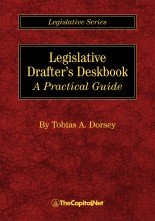There are many questions that must be considered regarding the drafting of any policy and one is whether Congress actually has the power to do whatever the policy calls for. It must be kept in mind that the federal government only has very limited as well as enumerated powers. Furthermore, the powers of Congress are completely separate from the powers of the judicial and executive branches. There are many as well as varied powers that Congress can use as basis for a law. The two powers that are invoked most frequently are the spending power (Article I, Section 8, Clause 1 of the Constitution) and the commerce power (Article I, Section 8, Clause 3 of the Constitution).

It is also important to consider whether any proposed policy is in danger of running into problems regarding constitutional limitations on power. For instance, Congress may well have a general power to enact a policy but if that policy is in violation of certain principles, such as separation of powers or individual rights, the law could be held to be unconstitutional. In the past, Congress has enacted laws that were ultimately determined by courts to be unconstitutional.
Ideally, any concerns regarding constitutional issues are identified and resolved as early as possible in the process of drafting legislation. Whenever there is a concern regarding the constitutionality of a policy, a different solution may be necessary. It is usually far better to identify concerns and address them early rather than wasting time and other resources on pursuing a solution  that may not be feasible due to constitutional concerns later on.
that may not be feasible due to constitutional concerns later on.
In considering the constitutionality of a policy, it is important to keep in mind that Congress is provided with a fairly large number of powers that are narrow in scope and only three broad powers. Narrow powers relate to civil rights, naturalization, elections, patents and copyrights, relations among states and the military. Broad powers relate to the commerce clause, the power to tax and spend and the necessary and proper clause. Furthermore, legislative powers are not absolute and are balanced and limited by the powers of the other two branches of government as well as the rights of the people and the sovereignty of the states.
Reference: Legislative Drafter’s Deskbook, by Tobias Dorsey, Section 4.50 Considering the Constitution, Section 4.51 Sources of Power, and Section 4.52 Limitations on Power; United States Constitution.
For more than 40 years, TheCapitol.Net and its predecessor, Congressional Quarterly Executive Conferences, have been teaching professionals from government, military, business, and NGOs about the dynamics and operations of the legislative and executive branches and how to work with them.
Our custom on-site and online training, publications, and audio courses include congressional operations, legislative and budget process, communication and advocacy, media and public relations, testifying before Congress, research skills, legislative drafting, critical thinking and writing, and more.
TheCapitol.Net is on the GSA Schedule, MAS, for custom on-site and online training. GSA Contract GS02F0192X
TheCapitol.Net is now owned by the Sunwater Institute.
Teaching how Washington and Congress work ™

